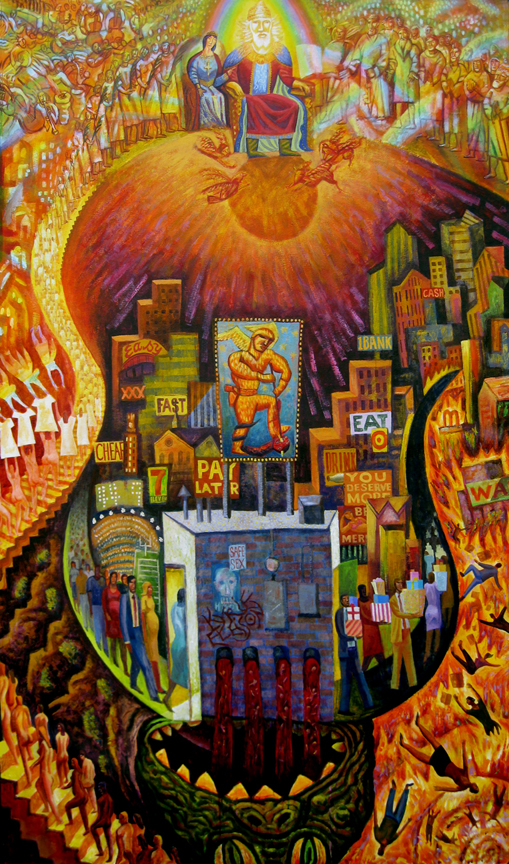Someone asked him, “Lord, will only a few people be saved?” It’s a fair question, and not unimportant to our faith. It touches on divine justice and mercy, on eternity and evangelization, on grace and merit. Unfortunately, our Lord doesn’t seem to give a direct answer. Neither a Yes nor No, nor any statistics on Heaven and Hell. Instead, He gives an exhortation and tells a parable.
Of course, He is not avoiding the question. Our Lord’s response indicates that, contrary to popular opinion, salvation will be – at the very least – difficult. Thus the exhortation to strive to enter through the narrow gate. But more to the point, He addresses two problems that typically surface in discussions about Heaven’s population: curiosity and complacency. The directness of His reply addresses curiosity. Its content addresses complacency.
Someone asked him, “Lord, will only a few people be saved?” Notice that in response our Lord addresses – in fact, commands – the questioner directly: Strive to enter through the narrow gate. This blunt response (not actually an answer) indicates that the man’s concerns needed to be redirected. It reveals a certain smugness about the man’s question. He is curious about Heaven’s statistics, but less concerned about his own salvation. Of course, he should not ask about others as much as about himself. His question should not be a hypothetical one about others, but a personal one about himself: What must I do to be saved?
It is this unasked question that our Lord answers: Strive to enter through the narrow gate. In effect, You, stop occupying yourself with questions about others. . . . Consider your own situation and what you need to change to attain Heaven. Jesus’ response resembles His exchange with Peter at the Sea of Tiberius. (Jn. 21:20-23) Peter sees John and asks, Lord, what about him? Our Lord responds, What if I want him to remain until I come? What concern is it of yours? You follow me.
What concern is it of yours? You follow me. It is good to be concerned about the salvation of others and likewise about the theology of salvation. But when that concern distracts us from our own salvation and need for conversion – as it seems to have done to the questioner in this passage – then it becomes a distraction, a vain curiosity.

But we like that distraction. To consider our own salvation is a difficult, daunting thing. It’s so much easier to speculate about others. So rather than looking to our own salvation, we consider salvation in the abstract or wonder about the fate of our neighbors. To break us of this vain curiosity, our Lord addresses us directly: Strive to enter through the narrow gate.
Second, the content of our Lord’s response seeks to shock the questioner – and us – out of complacency. Strive to enter through the narrow gate.The Greek for strive is “agonizesthe,” from which we have agony. A literal translation would be agonize to enter the narrow gate. Heaven is not easily entered. God’s grace does not bear fruit in our lives unless we strive – agonize– to cooperate with it. It requires that we daily put to death the rebellious man within us and clear out room for grace to work. We cannot sit back, relax, do nothing – and then expect to enter Heaven. There’s no such thing as coasting upwards.
In contrast, our Lord’s parable tells the fate of those who do not strive. They know the Master of the house, but only in passing and superficially. He was among them, drinking in their company and teaching in their streets. But He did not know them because they never bothered to acquaint themselves with Him. They were near Him and around Him, perhaps in the crowds that followed Him. But they never took the time to know Him directly and personally.
Ironically, this complacency threatens those who already believe. That is why our Lord addresses His entire lesson not to unbelievers but to those who follow Him, to those who feel comfortable enough to cry out, Lord, open the door for us. It is a caution to those who feel so comfortable in the Church that they may for that very reason become lazy and too casual about divine things. Indeed, we can know about our Lord – the stories, teachings, parables, miracles, etc. – without ever actually knowing Him.
Complacency is the point at which the routine becomes rote. Somehow, somewhere along the way, what began as the shaping of our lives around the faith becomes the shaping of the faith around our lives. We continue with our prayers, devotional practices, Mass, etc. But the situation has changed. The faith remains a part of our lives; it just ceases to determine our lives.
Strive. That one word captures what must be a constant in the Catholic life: a striving to subject every part of our lives to His gentle yoke; an agonizing to be freed from whatever keeps us from Him in the slightest; a toiling to grow in His likeness.
*Image: Last Judgment by James B. Janknegt, 2008 [Mr. Janknegt’s work can be found here]















